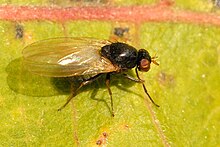Calliopum
Appearance
| Calliopum | |
|---|---|

| |
| Calliopum simillimum | |
| Scientific classification | |
| Domain: | Eukaryota |
| Kingdom: | Animalia |
| Phylum: | Arthropoda |
| Class: | Insecta |
| Order: | Diptera |
| Family: | Lauxaniidae |
| Subfamily: | Lauxaniinae |
| Genus: | Calliopum Strand, 1928[1] |
| Type species | |
| Lauxania scutellata | |
| Synonyms | |
Calliopum is a genus of small flies of the family Lauxaniidae.
Description
[edit]
Most, but not all, are luscious black or metallic flies.[1] They are smaller than 5 mm and usually have iridescent eyes. Adults can be found from May until December in meadows and hedge rows.[2] The larvae may be phytophagous or saprophagous, mainly feeding on rotting vegetable matter or mining clover leaves.[3]
Distribution
[edit]These species are present on most of Europe, in the eastern Palearctic realm, in the Near East and in North Africa.[4]
Species
[edit]- C. acrostichalis Sasakawa & Kozanek, 1995
- C. aeneum (Fallén, 1820)[1][5]
- C. albomaculatum (Strobl, 1909)
- C. annulatum (Becker, 1907)[1]
- C. blaisdelli (Cresson, 1920)
- C. caucasicum Shatalkin, 1996[1]
- C. ceianui Papp, 1984[1]
- C. dolabriforme Sasakawa & Kozanek, 1995
- C. elisae (Meigen, 1826)[1][5]
- C. ellisiorum Shatalkin, 2000[1]
- C. geniculatum (Fabricius, 1805)[1][5]
- C. hispanicum (Mik, 1881)[1]
- C. indecorum (Loew, 1862)
- C. livingstoni (Coquillett, 1898)
- C. nigerrimum (Melander, 1913)
- C. oosterbroeki Shatalkin, 2000[1]
- C. pacificum (Cole, 1912)
- C. potanini Czerny, 1935
- C. quadrisetosum (Thomson, 1869)
- C. rufipes (Czerny, 1932)[1]
- C. sakhalinicum Shatalkin, 1996[1]
- C. scutellata (Curran, 1926)
- C. simillimum (Collin, 1933)[1][5][6]
- C. splendidum Papp, 1978[1]
- C. tripodium Carles-Tolra, 2001[1][7]
- C. tunisicum Papp, 1981[1]
References
[edit]- ^ a b c d e f g h i j k l m n o p q Шаталкин, Анатолий Иванович (2000). Определитель палеарктических мух семейства Lauxaniidae (Diptera) [Keys to the Palaearctic flies of the family Lauxaniidae (Diptera)] (Print) (in Russian). Vol. 5. Moscow: Zoologicheskie Issledovania. p. 102.
- ^ Commanster
- ^ Semelbauer, Marek; Kozánek, Milan (2012). "Morphology of preimaginal stages of Lauxania and Calliopum (Diptera: Lauxaniidae)". Zootaxa. 3346. Magnolia Press: 1–28. doi:10.11646/zootaxa.3346.1.1. ISSN 1175-5326.
- ^ Fauna Europaea
- ^ a b c d Chandler, Peter J. (1998). Checklists of Insects of the British Isles (New Series) Part 1: Diptera. Handbooks for the Identification of British Insects. Vol. 12. London: Royal Entomological Society of London. pp. 1–234. ISBN 0-901546-82-8.
- ^ Collin, J. E. (1933). "Five new species of Diptera". The Entomologist's Monthly Magazine. 69: 272–275.
- ^ Carles-Tolra, M. (2001). "Calliopum tripodium sp n. a new lauxaniid species from Andorra (Diptera: Lauxaniidae)". Zapateri. 9: 103–105.
External links
[edit]
